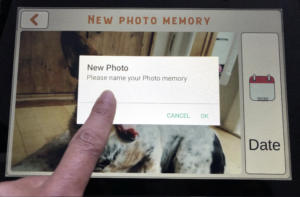
Memory Machine (MeMa) 3.0


The Memory Machine is an exciting ongoing Horizon funded project looking at how digital technology can support the preservation of memories. The Memory Machine app captures and records personal memories and then allows the user to contextualise these memories in a timeline with additional information, to create meaning behind the memory. This app has been developed with an interdisciplinary team of artists and experts in psychology, computer science, cultural studies, law and including, allowing different viewpoints of the experience to be considered, all with the end-user at the very centre of the design process. Such a device could be used in a variety of ways, including to support the memory and wellbeing of those with dementia and their carers, as a method to share memories with friends and family, as an end-of-life legacy, and as a tool for cultural heritage.
We want to explore the experiences of different potential users of the Memory Machine. We’re interested in different topics including the experience of uploading memories to the app, concerns around privacy and security when using such a device and exploring how memories may be gifted or shared with others through technology. We’ve already spoken with older adults who would feel comfortable using a device on their own, but now we want to hear from family members who may use this device to share memories with another family member or friend, and from older adults who may feel better supported if using the machine alongside someone like a spouse, carer, or family member.
If you think you may want to get involved, we’d love to hear from you!
You need to be someone who would use the Memory Machine app with a family member or friend to share memories, or an older adult who would be supported by someone to use the Memory Machine app. You need be based in or near to Nottingham to allow for delivery and collection of the Memory Machine and have access to a device that would enable you to join the online workshops.
There are three online workshops, lasting 1.5 hours each, that we’d invite you to join at a time suited to you. There will also be an opportunity to be included in an interview after the workshops have ended. You would receive a £60 voucher as inconvenience allowance for taking part in our workshops.
If you think you may be interested, or want to find out more, please contact Camilla.Babbage
Horizon Research Fellow Dominic Price is currently at DIS 2019, ACM Designing Interactive Systems 2019 in San Diego, California presenting the Memory Machine.
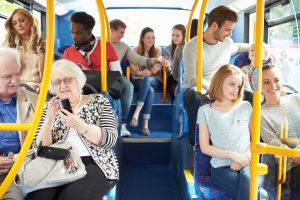
In My Seat is recruiting…
We have created a mobile application designed to be used on your journeys around the campuses, which allows you engage with your local surroundings, by linking you to various types of content, including local information and user-generated content, through your specific journey.
We are looking for a group of people to test the prototype application and provide feedback on the experience.
This will involve
You will be thanked for your time with a £20 high street voucher.
The studies will begin in the week commencing 13th May 2019. For more information, and to register your interest, please email Dr Liz Dowthwaite.
Please note that to take part you must have an Android phone running at least version 4.4 (KitKat).
Memory Machine Workshop 3
21st September 2018
Identity and wellbeing
We had a diverse group join us for our third workshop which started with a short walk outside, down to the Raleigh commemoration sculpture:
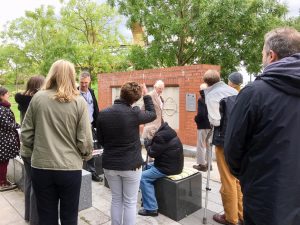
Landscapes prompt memories, as does the weather – as we found when it started raining! So we rapidly retreated indoors. We discussed local places and community connections and their importance in building a sense of familiarity and identity. One of our participants talked about walking around Nottingham, looking at old buildings, and that seeing a building or street from a particular angle would evoke a memory – perspective and place is so important in our memories. In Nottingham we are lucky to have archives from local industries; Raleigh bikes (the factory stood on the site of our new campus) and Boots pharmaceuticals and toiletries. Participants mentioned that Nottingham is also famous for less healthy products; such as beer and tobacco.
I gave a brief talk about how place is connected with health in many different ways. As well as working life, our home life and communities hold strong memories. We had three groups discussing their memories of place and community. Memories of Trent bridge leather tannery, and streets of small shops including a tattoo parlour!
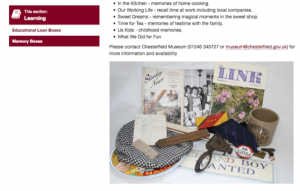
Rachel Jacobs described some interactive and digital experiences that explored issues of wellbeing and place, as well as interesting interactive public displays and interventions. These included:
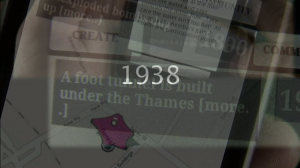
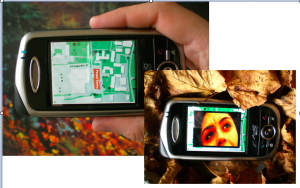
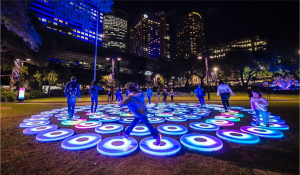
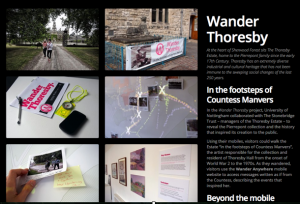
Rachel talked about how the Memory Machine might be able to link into similar forms of interactive experiences either at home or in familiar places, or areas of local interest so that people could both share and access their memories of these places. She spoke about the value of our memories and how the memories and experiences of older generations can enrich the experience of being in places and help us to understand the history, as well as the present and future of the place where we live and work.
Our three groups then considered how a digital ‘memory machine’ might capture some of these memories about place. One group considered an ‘outdoors Alexa’- a kind of ‘listening post’ where people could record, and share, their own recollections of that place – e.g. a street or a park. This idea grew legs! We discussed how people could meet at one of these posts, and then walk together, discussing memories, and recording them at the next post. With a mechanism to assign this shared recording to your personal account – when you got home you could listen again.
Listening again, or recording from one place, but playing back inside, prompted discussion of sharing with residents of a care home or others who may not be able to get out and about. We thought about how to encourage individuals and families at early stages of dementia to start recording memories, or making notes. We had health and social care practitioners in the group who shared their experience of caring for people, and how prompts and recordings could be useful.
Another group discussed a similar use of the memory machine in a park such as Gedling Country Park, with a listening area where people can sit and hear about the history of the park and colliery that used to be there and share their own memories, and people who can’t get to the park can also take part in the conversation and share experiences of being in the park and their own memories from home or a care centre. They also talked about how we manage difficult memories as well as joyful ones and how you can create the right experience to help people to access different memories in a positive way. The group also talked about the positives and negatives of technology and the internet and how it is affecting younger generations and changing how they communicate with each other – how it can both bring people together, and make people feel isolated.
During the session I learnt a lot about Nottingham from the older members of the group. How black lead was used in the laceworks, which would cause damage to the brain and memories of the workers. I said how lucky we are that we can just type into a websearch any locality or industry and rapidly find some information, pictures or archives. One group had discussed cigarette cards – the Google of their generation! Recalling previous generations, we discussed how statues and stained glass of churches were a way of representing Biblical people and stories when the text was in inaccessible Latin.
Places and industry can prompt painful memories; we should not ignore difficult memories, but be aware of our reactions to these. Overall, we discussed how familiar places are interlinked with and our sense of identity and wellbeing. Neil suggested that many of the topics could be linked to Five Ways to Wellbeing – an evidence base linking activities to health and wellbeing – Connect, Be Active, Take Notice, Keep Learning and Give.
Raleigh archive: http://www.iworkedatraleigh.com/
John Players archive: https://www.nottingham.ac.uk/connectedcommunities/projects/john-player-archive.aspx
Written by Neil Chadborn
In order to reflect on impacts for wider human values and embed safeguards into technologies being introduced by Services Campaign projects, Peter and Lachlan have been holding workshops with members of Memory Machine, In My Seat and Panopticon. These workshops used the Moral-IT and Legal –IT cards developed as part of the Towards Moral-IT and Legal-IT research ongoing at Horizon Digital Economy Research.
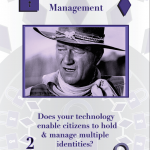
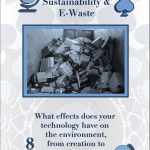
As mentioned in the previous blog, the Legal-IT cards translate a range of data related legal frameworks into card form, from the new EU General Data Protection Regulation 2016 and Network and Information Security Regulation 2016, to the earlier Cybercrime Convention 2001. The Moral-IT cards pose difficult ethical questions clustered under the themes of privacy, security, law and ethics, such as “IDENTITIES MANAGEMENT: does your technology enable users to hold and manage multiple identities?” or “SUSTAINABILITY AND eWASTE – What effects does your technology have on the environment from creation to destruction?”. These thought provoking questions help participants to think of unexpected implications of their technology.
During a workshop, participants were asked to reflect on the technology they were building and identify an overall ‘ethical risk’ that may impact the social desirability of the technology and for its users, particularly in relation to its use of personal data. This could include the identity risks from sensitive data being compromised by poor data security practices, or personal privacy harms for individuals’ private details being made visible to unexpected parties. The groups used the Moral – IT and Legal-IT cards in a streamlined ethical impact assessment process to reflect on the overall risk, discuss and identify potential safeguards against these risks and also identify challenges of implementation of these safeguards. This activity resulted in a wide range of critical ethical questions being explored in relation to the technology with the cards and structure of the task enabling the participants to navigate the difficult ethical questions and link their technology to ethical and legal concerns more widely.
The cards were also used as part of workshop run by Lachlan and Martin Flintham, as part of their Digital Research funded project, to generate thought and encourage discussion about ethical implications of using the ‘Internet of Things’ in both the university and research environment.
We were pleased with how the participants took to the cards. They enjoyed using them and found them helpful in exploring and engaging with the ethical and legal issues in relation to their technology. They were received well, with their utility in structuring debate around complex topics. However, they also brought the wide range of issues to the fore. We are therefore encouraged that the cards have the potential to be a particularly useful tool in enabling technology developers and users to reflect on and navigate the complex ethics of their technology and produce more socially desirable technology as a result.
If you would like to know more, the Moral-IT and Legal-IT cards, and an outline of a way to use them, are now available to download online from ‘Experience Horizon’– a website which provides opportunities to try out some of the outputs from projects conducted at Horizon Digital Economy Research. If you do choose to investigate them further, we would really like to build up dialogue on who you are, how you are using the cards, why and any feedback you have on the tool/process. Please send these on to lachlan.urquhart@gmail.com.
Members of the Privacy, Law and Ethics Cross Cutting Theme are planning analysis and preparing a paper to submit to the Journal of Responsible Innovation, towards the end of the year.
Finally, following a presentation of the project, the Privacy, Law and Ethics Cross Cutting Theme project has been neatly summed up in a visual form as can be seen below – our thanks and acknowledgment to Rikki Marr of HAWK&MOUSE.
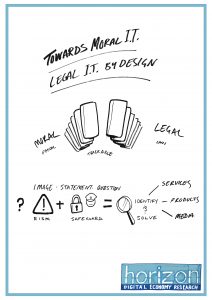
Written by: Lachlan Urquhart and Peter Craigon
This was a presentation I gave internally to the Horizon research team on the development of the Chronicle platform. Of course it’s missing the audio but I’ve attempted to annotate the slides with enough information to give a flavour of the meaning.
Links
Dominic Price, Research Fellow, Horizon Digital Economy Research
A chronicle (Latin: chronica, from Greek χρονικά, from χρόνος, chronos, “time”) is a historical account of facts and events ranged in chronological order, as in a time line (Wikipedia). Chronicle is also the name of the platform being developed by Horizon to support its Services Campaign projects. These projects are categorised by the necessity of keeping an electronic record of facts and events relating to a thing. Take for example the Memory Machine project, the thing in this instance is the physical artefact (the Memory Machine), and the electronic record is the content being added to it. So far so boring, the platform could be little more than a database.
Where the Chronicle platform gets interesting however, is as a tool to support the concepts of ownership, sharing, and gifting. Take again the example of the Memory Machine; the physical artefact itself is owned by an individual. It’s intended use though is for third parties to have the capability to share content that that party has some ownership of. The physical heirloom may also (ideally) gain an heirloom status in which it is gifted and regifted. These actions begin to create new layers of complexities that mean our simple database begins to look a lot more complicated.
The Chronicle platform is being designed and built to support these interactions but also to ask its own questions such as:
You can follow the progress of the development of Chronicle at https://chronicle.horizon.ac.uk/ and on Bitbucket at https://bitbucket.org/account/user/horizon-dev/projects/CHRON.
Featured image by Peterborough.Chronicle.firstpage.jpg: en:User:Geogrederivative work: Hchc2009 (Peterborough.Chronicle.firstpage.jpg) [Public domain], via Wikimedia Commons
Dominic Price, Research Fellow, Horizon Digital Economy Research